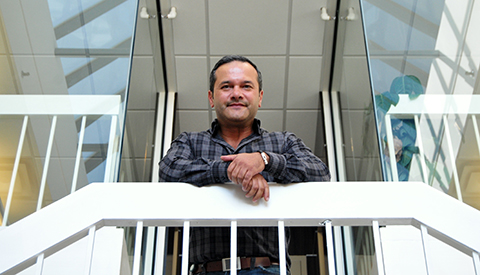As opportunities surrounding the Internet of Things (IoT) continue to grow, Cambridge-based LogiSense is growing along with them.
The company, which specializes in monetizing IoT information transactions, says it has seen 40 per cent growth year-over-year and expects to hire about 30 more employees in the next year, bringing the total number of workers to 100.
A good portion of that is in software development, said CEO Flavio Gomes, but it also includes project managers, solutions consultants, sales and marketing.
“We’re growing in all areas of our business,” said Gomes, seated inside his office at 278 Pinebush Rd. He's considering opening offices in British Columbia and Europe, and may need to find more space locally as well.
In many ways, the company’s expansion mirrors the growth of IoT.
Last year, technology consulting firm Gartner, Inc. predicted there could be as many as 20.8 billion connected devices in the world by 2020 (about triple the estimated 6.4 billion this year), while Ericsson Mobility estimates that number could be around 28 billion by 2021.
Others still have predicted the number could actually hit 50 billion.
Regardless of which figure turns out to be correct, the IoT market will be significant, and LogiSense expects about $10 million in revenue this year alone.
“It’s absolutely huge,” he said, citing industry expectations that IoT could impact the economy by as much as $14 trillion by 2030. “That’s a lot of money.”
And while much of the IoT discussion has been centred on connected devices for the home, such as smart light bulbs, smoke detectors, garage door openers and so on, LogiSense has been focused on industrial and business applications of the technology.

Flavio Gomes, CEO of LogiSense, may soon be looking for a larger office due to
rapid growth. (Photo: James Jackson)
Gomes and his team have spent close to a decade building LogiSense into a company ready to cash in on that market – all without relying on venture capital investment to grow the business. Founded in 1998, LogiSense serves more than 40 customers in six countries.
“We’re organically grown. We’re driven by our own revenues,” he said, though they have taken advantage of some government grants.
His company makes it easier for businesses to organize and monetize the billions of transactions, also referred to as “events,” that occur whenever connected devices are turned on or communicate to each other.
Whether it’s a shipping pallet communicating with the head office to help co-ordinate inventory and supply chain management, or a sensor in a restaurant fryer informing the oil company about the quality of that oil so they know exactly when to replace it, LogiSense helps companies make sense of all that data and bill their customers accordingly through a platform called EngageIP.
“We’ve developed state-of-the-art billing capabilities that allow (companies) to monetize all of these events, all of these transactions,” he said.
Companies charge their customers a subscription fee to access the cloud-based software platform as well as a fee for each transaction or event.
It’s all part of a larger societal shift towards what LogiSense has coined the “usage economy” – charging customers for what they actually use.
Rates vary based on the time of day, the type of application being used and how frequently the devices communicate, and the pricing model leads to more dependable revenue streams for companies, Gomes said.
“Everyone wants recurring revenue,” he said, “it’s easier to predict revenue and cash flow.”
LogiSense has clients around the globe, including big names like Garmin, Vonage and Ingenu – a world leader in the development of machine-to-machine communications that is building a network in the United States and have licensed their technology to countries outside the U.S.
Ingenu CEO John Horn said LogiSense provided an easy-to-use billing platform in a timeframe their competitors just couldn’t match.
“LogiSense was very nimble and knew what we needed,” said Horn. “We’re excited to have them as a partner and we’re going to build something fun together.”
Gomes said the next big market will be in the residential sector of IoT, but it needs critical mass before it can be successful.
The public sees IoT connectivity as an “extravagant remote control” that allows you to set your alarm when you’re not at home or dim the lights using your smartphone, he said.
Yet he predicts the future will include IoT fridges that know what groceries you need and when you need them, and grocery stores will bid on the contracts to fill those orders.
When the time is right, LogiSense could shift into the consumer household market if they choose to, Gomes said.
“It wouldn’t take much to repurpose our platform for carriers servicing the house, or utilities servicing the house,” he said.

